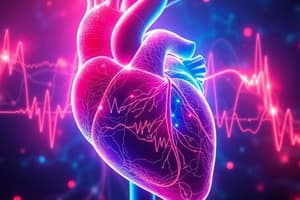Podcast
Questions and Answers
What does a decrease in systolic pressure with little change or an increase in diastolic pressure indicate?
What does a decrease in systolic pressure with little change or an increase in diastolic pressure indicate?
- Normal cardiac output
- Low cardiac output (correct)
- High cardiac output
- High systemic vascular resistance
What is the normal range for pulse pressure?
What is the normal range for pulse pressure?
- 20-40 mmHg
- 60-80 mmHg
- 80-100 mmHg
- 40-60 mmHg (correct)
Which condition is most likely associated with a pericardial friction rub?
Which condition is most likely associated with a pericardial friction rub?
- Septal defects
- High blood pressure
- Pericarditis (correct)
- Valvular heart disease
What is the significance of diastolic blood pressure measurement?
What is the significance of diastolic blood pressure measurement?
In which condition would you expect a narrowing of pulse pressure?
In which condition would you expect a narrowing of pulse pressure?
Describe the potential cause of a pericardial friction rub and the associated symptom.
Describe the potential cause of a pericardial friction rub and the associated symptom.
Explain what positional murmurs may indicate in terms of heart conditions.
Explain what positional murmurs may indicate in terms of heart conditions.
Define pulse pressure and provide the normal range.
Define pulse pressure and provide the normal range.
What does a narrowing of pulse pressure suggest and in what conditions is it commonly seen?
What does a narrowing of pulse pressure suggest and in what conditions is it commonly seen?
Explain the significance of diastolic blood pressure measurement and what it indirectly measures.
Explain the significance of diastolic blood pressure measurement and what it indirectly measures.




